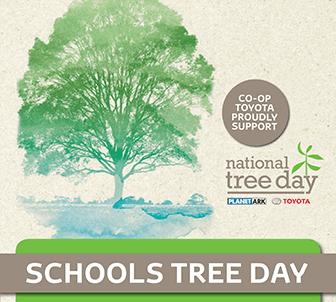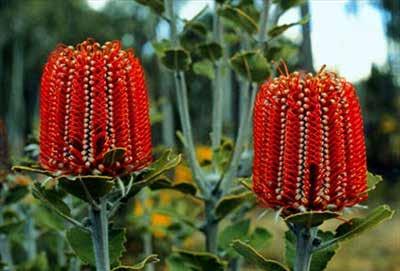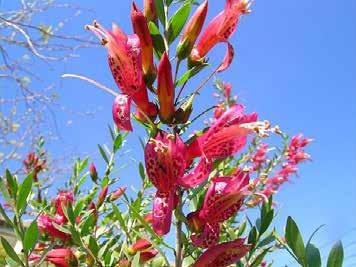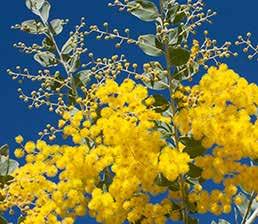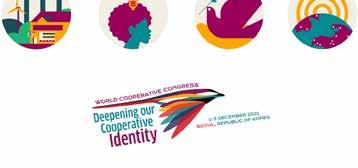
13 minute read
July
INTERNATIONAL DAYS INTERNATIONAL
DAYS JULY
Advertisement
3rd July – International Day of Cooperatives Founded in 1895, the International Cooperative Alliance is one of the oldest and largest (with 1.2 billion cooperative members) non-government organisation globally. It works to create the legislative environments that allow cooperatives to form and grow. Cooperatives are people-centred enterprises jointly owned and democratically controlled by their members to realise common socio-economic needs and aspirations. Managed by producers, users or workers, cooperatives are run according to the ‘one member, one vote’ rule. Cooperatives employ 280 million people (10% of the world’s employed population), with the largest 300 cooperatives and mutuals reporting a total turnover of 2,034.98 billion USD. Cooperative principles include: • voluntary and open membership; • democratic member control; • member economic participation; • autonomy and independence; • education, training and information; • cooperation among cooperatives; and • concern for community. International Day of Cooperatives is to strengthen the potential of cooperatives in solving economic, social and environmental problems, to minimise and improve legal and administrative constraints on cooperatives and to improve the contribution of cooperatives to national economies.
4th to 11th July – NAIDOC Week NAIDOC (National Aborigines and Islanders Day Observance Committee) Week is usually held in the first full week of July. In 2021, it falls between the 4th and the 11th of July. NAIDOC recognises the history, culture and achievements of Aboriginal and Torres Strait Islander people and is celebrated by all Australians.
• cultural and educational activities in schools and workplaces, and public displays; • listening to Indigenous Australian music; • reading Dreamtime stories; • visiting Indigenous Australian websites on the
Internet; and
• organising an art competition.
11th July – World population Day In 1950, five years after the United Nations was founded, the world population was around 2.6 billion people. By 2020 it had reached 7.8 billion (with at least 55% living in urban areas) and by 2050 there will be 9.7 billion. Take a look at the dashboard at https://www.unfpa.org/data/worldpopulation-dashboard for annually-updated global population data. Interestingly, though fertility rates have fallen (from 4.5 children per woman in the 1970s to 2.4 in 2020), life expectancy has risen (64.6 years in the 1990s to 73 in 2020). Such population megatrends affect economic development, employment, income distribution, poverty, social protections, access to health care, education, housing, sanitation, water, food and energy. World Population Day began in 1989 with the purpose of finding solutions to meet the needs of our world’s growing population sustainably.
12th July – Malala Day The United Nations has declared 12th July as World Malala Day to honour the young activist, Malala Yousafzai. Malala Day is commemorated on the birthday of Malala Yousafzai to honour the rights of women and children around the world.
On the 9th of October 2012, Malala was shot in the head by Taliban gunmen after she publicly advocated for the education of girls. Despite the attack, Malala soon returned to the public eye, fiercer in her views than earlier and continued her advocacy for gender rights. She founded the Malala Fund, a non-profit organisation to help young girls go to school and also co-authored a book titled “I Am Malala”, an international bestseller.
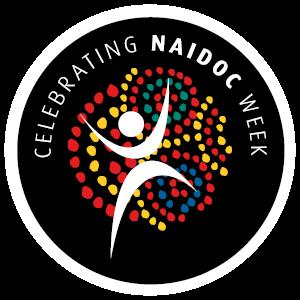
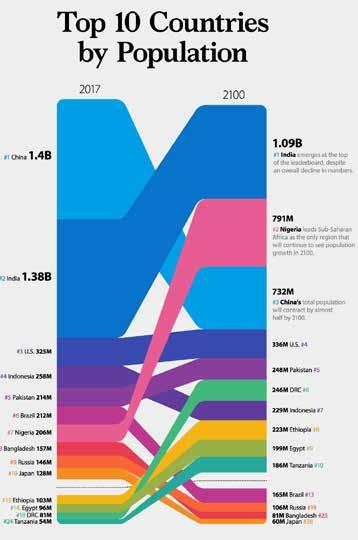
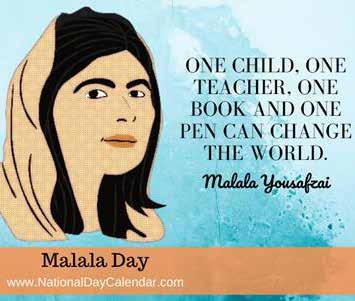
14th to 20th July – National Diabetes Week Each year Diabetes Australia celebrates National Diabetes Week to raise awareness about diabetes in Australia. The campaign aims to educate Australia of the risk factors for, and the prevention of, Type 2 diabetes. In 2021, Diabetes Australia is continuing their Heads Up campaign which focuses on the mental and emotional health of people living with diabetes. This year, the spotlight is on diabetes stigma and mental health. More than 4 in 5 people with diabetes have experienced diabetes stigma. Nearly 50 per cent of people with diabetes have experienced mental health challenges in the last 12 months.
Stigma affects all aspects of life for people with diabetes, including their mental health and wellbeing. People experience diabetes stigma when they are blamed for having diabetes, while managing diabetes such as injecting insulin in public and when they experience the affects and complications of diabetes such as low blood sugar. 18th July – Nelson Mandela International Day As expressed by Nelson Mandela,“It is easy to break down and destroy. The heroes are those who make peace and build.” Nelson Rolihlahla Mandela (1918–2013) was the first black President of South Africa (1994–1999) and a Nobel Peace Prize winner (1993). His negotiations helped end the country’s apartheid system of racial segregation and ushered in a peaceful transition to majority rule. A lawyer, Mandela established South Africa’s first Black law practice and specialised in cases resulting from the post-1948 apartheid legislation. In 1955 he was involved in drafting the Freedom Charter, a document calling for nonracial social democracy in South Africa. From 1964 to 1990, Mandela was in prison, having been sentenced to life imprisonment following the Rivonia Trial. During his presidency, he established in 1995 the Truth and Reconciliation Commission (TRC), which investigated human rights violations under apartheid, and introduced housing, education, and economic development initiatives designed to improve the living standards of the country’s Black population. Nelson Mandela International Day is to take action and inspire change by making a difference in communities.
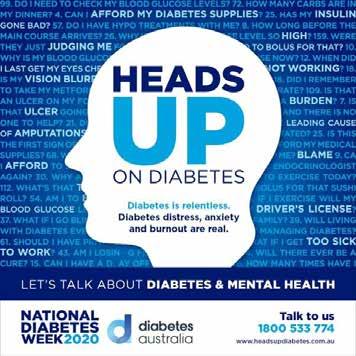
Suggested actions on this day include: • getting to know someone from a different cultural background — through mutual understanding we can rid our communities of intolerance and xenophobia; • reading to someone who can’t by, for example, visiting a local home for the blind and opening up a new world for someone else who has not had the advantage of education; • helping someone get a job by assisting them to put together a CV and with interview skills, and introducing them to networks; • having a conversation with someone who is terminally ill; • helping someone financially to get their eyes tested, teeth checked and for a general medical; • donating a wheelchair or guide dog to someone in need; and • buying a few blankets, or giving the ones you no longer need from home to someone in need.
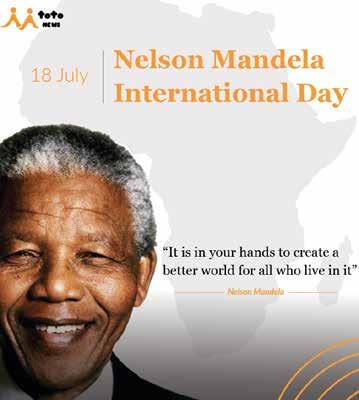
15th July – World Youth Skills Day In 2014, the United Nations General Assembly declared 15th July as World Youth Skills Day to
INTERNATIONAL DAYS
celebrate the strategic importance of equipping young people with skills for employment, decent work and entrepreneurship. Since then, World Youth Skills Day events have provided a unique opportunity for dialogue between young people, technical and vocational education and training (TVET) institutions, firms, employers’ and workers’ organisations, policymakers and development partners. TVET has a key role to play in fostering the resilience of young people. It is crucial for all stakeholders to ensure the continuity of skills development and to introduce training programmes to bridge skills gaps. Solutions need to be reimagined in a way that considers not only the realities of the present, but also the full range of possibilities for the future.
20th July – International Chess Day International Chess Day is celebrated annually on 20th July, in conjunction with the day the International Chess Federation (FIDE) was founded in 1924. The day is celebrated by many of the 605 million regular chess players around the world.
The idea to celebrate this day as the international chess day was proposed by UNESCO, and it has been celebrated as such since 1966, after it was established by FIDE. FIDE has 181 chess federations as its members and organises chess events and competitions around the world on this day. As recently as 2013, the international
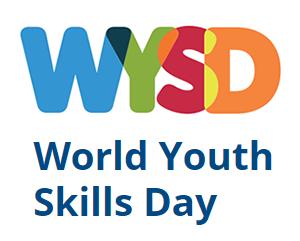
INTERNATIONAL DAYS
chess day was celebrated in 178 countries. On 12th December 2019, the UN General Assembly unanimously approved a resolution recognising the day.
25th July – World Drowning Prevention Day World Drowning Prevention Day was declared in April 2021 by the United Nations (UN) General Assembly to be held annually on 25th July. This global advocacy event serves as an opportunity to highlight the tragic and profound impact of drowning on families and communities and to offer life-saving solutions for its prevention. All governments, UN agencies, civil society organisations, the private sector, academia and individuals are invited to mark World Drowning Prevention Day by highlighting the need for urgent, coordinated and multi-sectoral action on proven measures such as: • installing barriers controlling access to water; • providing safe places away from water such as crèches for pre-school children with capable childcare;
• teaching swimming, water safety and safe rescue skills; • setting and enforcing safe boating, shipping and ferry regulations; and • improving flood risk management. The new UN General Assembly resolution invited WHO to coordinate actions on drowning prevention within the UN system. In this capacity, WHO leads preparations for World Drowning Prevention Day by producing related advocacy materials, hosting a global launch event and supporting national and local activities in countries and communities around the world.
28th July – World Hepatitis Day The liver is a vital organ that processes nutrients, filters the blood and fights infections. If inflamed or damaged, its function is affected. Heavy alcohol use, toxins, some medications and certain medical conditions can cause hepatitis. There are five main strains of the hepatitis virus – A, B, C, D and E. Together, hepatitis B and C are the most common cause of deaths, with 1.3 million lives lost each year.325 million people worldwide are living with viral hepatitis B and C. Only 42% of children, globally, have access to the birth dose of the hepatitis B vaccine.World Hepatitis Dayis to enhance awareness of viral hepatitis, an inflammation of the liver that causes a range of health problems, including liver cancer. The World Health Organisation suggests the following towards our globe becoming free of hepatitis by 2030:


PREVENT infection among newborns by vaccinating against hepatitis B at birth, followed by at least 2 additional doses.
STOP TRANSMISSION from MOTHER to CHILD by routinely testing mothers for hepatitis B, HIV and syphilis and ensuring treatment if needed. LEAVE NO ONE BEHIND with everyone having access to hepatitis prevention, testing and treatment services, including those who inject drugs, are in prisons, are migrants and other highly-affected populations. EXPAND access to testing and treatment, as timely testing and treatment of viral hepatitis can prevent liver cancer and other severe liver diseases.
MAINTAIN essential hepatitis services during pandemics – particularly infant immunisation, harm reduction services and continuous treatment of chronic hepatitis B.
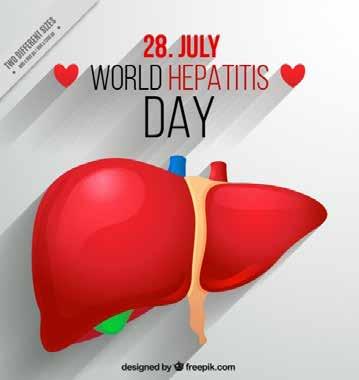
28th July – World Nature Conservation Day “Conservation means the wise use of the earth and its resources for the lasting good of men”- Gifford Pinchot.
World Nature Conservation Day is celebrated to raise awareness about protecting the natural resources and understand the importance of conservation. The main aim of this day is to come together and support nature. Conservation of nature is the wise management, preservation and saving of natural resources, and the understanding of the consequences of damaging nature. Due to natural imbalance, we are facing several problems like global warming, various diseases, natural disasters and increased temperature. It is necessary to preserve nature for generations to come. Some ways to preserve include: • starting your own garden; • having a no-car day; • recycling whenever possible; • quitting smoking; • making your own enivronmental friendly bags; and • not using paper tissues.
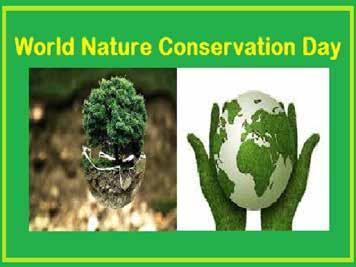
30th July – World Day against Trafficking in Persons Every year, thousands of children, women and men fall into the hands of traffickers, in their own countries and abroad. The Counter Trafficking Data Collaborative, the first global data hub on human trafficking, suggests that (at least) 100,000 people from 175 nationalities are trafficked each year, and that there are 164 countries of exploitation. The Protocol to Prevent, Suppress and Punish Trafficking in Persons defines Trafficking in Persons and notes exploitation as including prostitution of others or other forms of sexual
INTERNATIONAL DAYS
exploitation, forced labour or services, slavery or practices similar to slavery, servitude or the removal of organs. World Day against Trafficking in Persons is formed to raise awareness of the situation of victims of human trafficking, to promote and protect their rights and to eliminate trafficking.
30th July – International Day of Friendship International Day of Friendship is formed to inspire peace efforts and to build bridges between communities using friendship between peoples, countries, cultures and individuals. Governments, international organisations and civil society groups are encouraged to hold events, activities and initiatives that promote dialogue among civilisations, solidarity, mutual understanding and reconciliation. A culture of peace is defined as a set of values, attitudes and behaviours that reject violence and endeavour to prevent conflicts by addressing their root causes with a view to solving problems. Suggested activities for this Day of Friendship include: • preparing and giving small presents, like biscuits or chocolate, tied in bundles of cellophane with bright ribbon; • making a friendship band; • making a special ‘friendship book’ for a good friend, with photos, a drawing, poems or a story about your friendship; • reading and sharing stories about friends, discussing things you may do or feel that are similar;
• discussing how we can best be a good friend by making university, work, home and our communities a happier, friendlier place; • identifying how it feels when someone is kind to you and how it feels when you are kind to someone;
• creating a poem entitled ‘A friend like you’, or writing an acrostic poem using the word
‘FRIENDS’;
• writing about what a friend means to you, how you help each other, what you do and what makes a friendship special; and • brainstorming with others to make a list of what friends do together and sharing these lists.
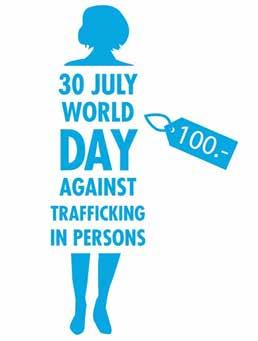
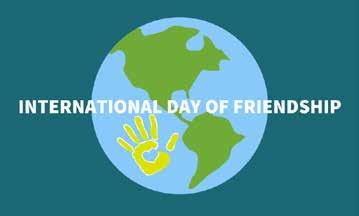
30th July – Schools Tree Day ‘The best time to plant a tree was 20 years ago. The second best time is now’ - Chinese proverb. Australia has over 24,000 species of native plants. Schools Tree Day is a great way to inspire students to learn about the local environment while playing an active role in their community. Planet Ark has many resources, suggested activities and toolkits
to assist, and schools across Australia can apply to the Seedling Bank, launched in 2019, for funding to buy native seedlings for their region. The most common Australian native plants are: Acacia (Wattles), with the golden wattle being is Australia’s floral emblem and Wattle Day celebrated on 1st September each year. Eucalypts, from the silver and red snow gums of the Australian Alps to the ancient river red gums in South Australia’s Flinders Ranges, with the Blue Mountains home to the world’s most diverse range of eucalypt species and deriving its name from the blue haze believed to be created from the oilbearing trees. Proteaceae, a family of flowering plants, including banksias, grevilleas and waratahs Melaleuca, known locally as paperbarks, tea trees or honey myrtles and found usually along watercourses or the edges of swamps. Wildflowers, transforming the arid and savanna grassland areas into carpets of colour when in season.
Haemodoraceae, including Kangaroo Paw with blooming colours ranging from yellow and green to red, pink, orange or brown. Eremophila, referred to as ‘emu bushes’ and producing fleshy fruits for animals and birds to eat.
